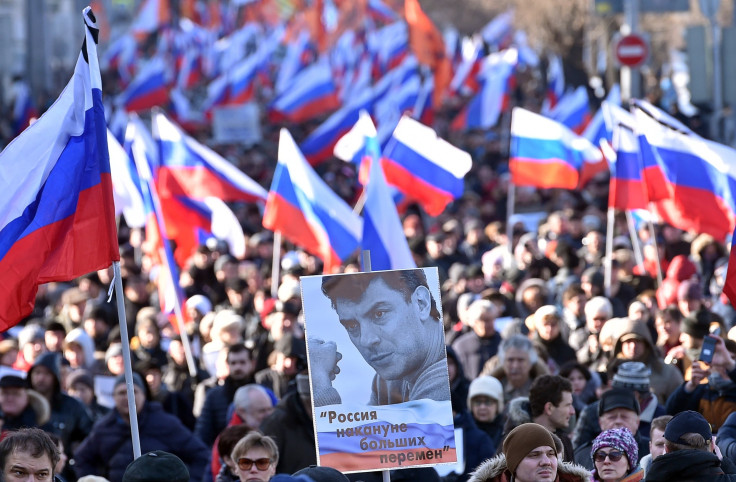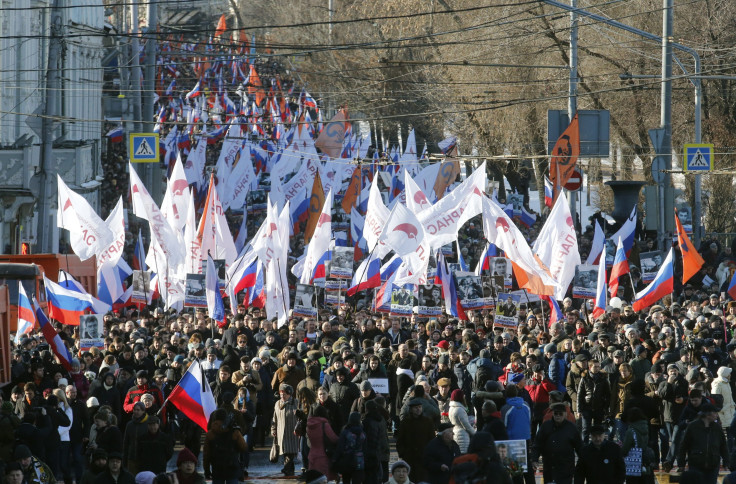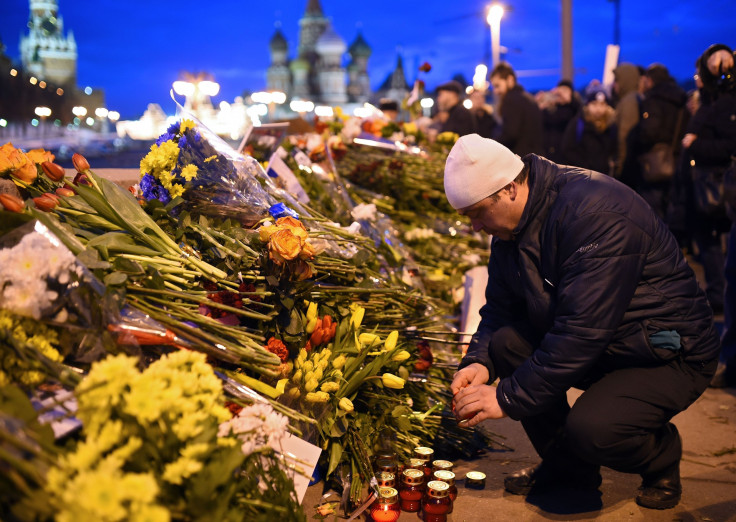One Year After Boris Nemtsov's Death, Thousands March To Commemorate Russian Opposition Leader [PHOTOS]

Thousands of marchers Saturday marked the one-year anniversary of the assassination of prominent Russian opposition leader Boris Nemtsov, 55, who was shot to death as he walked with his girlfriend across a bridge overlooking the lofty domes of St. Basil’s Cathedral in Moscow, just steps from the Kremlin walls.
The march was the largest such event since a mourning rally just days after the high-profile political assassination.
Russian investigators have charged five Chechen men with killing Nemtsov, an outspoken critic of President Vladimir Putin and a former deputy prime minister. But his supporters say the suspects are just low-level operatives who were paid to kill the opposition politician. During Saturday’s commemorative march, they pressed their demand that authorities find and punish the person who ordered the assassination.
“Nemtsov was killed because he had exposed Putin for what he was in various reports,” marcher Irina Vorobyova, 60, told Reuters. “He was a worthy political opponent for Putin but he had insulted him.”

Like many of Nemtsov’s supporters, Vorobyova said she believes Ramzan Kadyrov, the Kremlin-backed leader of Chechnya, ordered Nemtsov's killing to please Putin. Although he denies any involvement, Kadyrov has praised one of the murder suspects as “a true patriot of Russia,” Reuters reported.
In an interview with the magazine Sobesednik last year prior to his death, Nemtsov said he feared Putin would have him killed because of his opposition to the war in Ukraine. One day after the killing, Ukrainian President Petro Poroshenko said Nemtsov had told him weeks earlier he planned to reveal evidence of Russia’s involvement in the Ukraine conflict.
“He said he would reveal persuasive evidence of the involvement of Russian armed forces in Ukraine. Someone was very afraid of this,” Poroshenko said Saturday in televised remarks during a visit to the city of Vinnytsia.“They killed him.”

Police estimated the number of attendees at Saturday’s march to be 7,500, but one group of observers put the number at 25,000. Some demonstrators carried portraits of Nemtsov, chanting “Russia will be free” and “Russia without Putin.” Others held banners reading “Killed for the truth” and “Who is next?” Similar rallies took place in other towns across Russia.
“I participated in the mourning procession on March 1 last year, and I have come again today because I’m still mourning,” Natalia Pshenichnikova, 74, a retired librarian told the Financial Times. “One year on, we miss him not less but more. In such times when someone can just be killed from behind in the street, when we are more and more afraid, we would have needed him, with his optimism, his decency and fearlessness.”
Prominent opposition politicians such as Ilya Yashin, a longtime ally of Nemtsov, former Prime Minister Mikhail Kasyanov and anti-corruption blogger Alexi Navalyn also attended the event in central Moscow, where supporters laid flowers at the spot on the bridge near Red Square where Nemtsov was killed by four shots.

Russia’s oppressive political climate has become even more so a year after Nemtsov’s death, despite attempts by other Kremlin critics to unite. Russian authorities banned opposition candidates from running in most regions in local elections last year. The few contenders who were cleared to compete — under exclusion from the official media and continuous harassment — lost badly, the Financial Times reported.
Putin condemned Nemtsov’s murder and immediately assumed personal control over the investigation. But Vladimir Kara-Murza, deputy chairman of Parnas, a party Nemtsov co-chaired until his death, suggested the Russian president was blocking a complete investigation.
“We will find out his murderers, and those who ordered the murder — if not under the current leadership, then under the next one,” he said in an interview with the Financial Times.
© Copyright IBTimes 2025. All rights reserved.




















